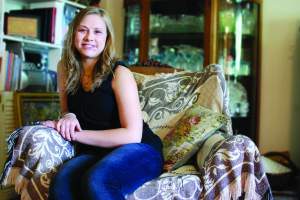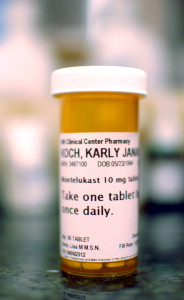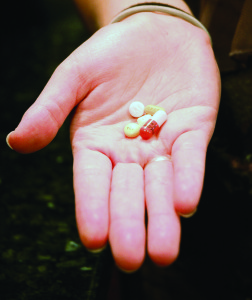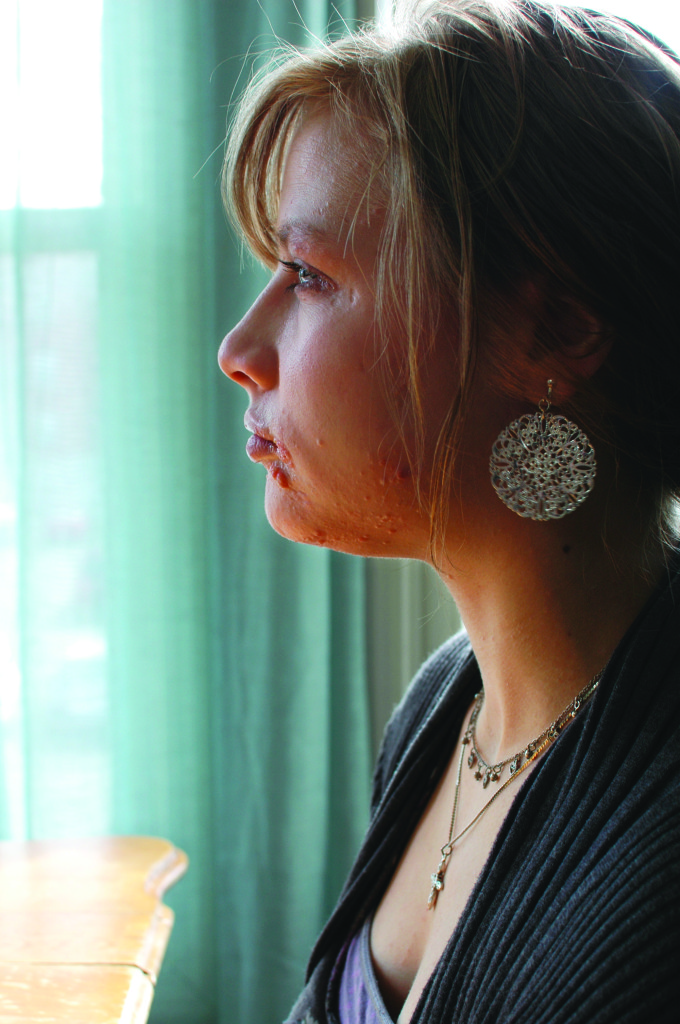Two sisters face a genetic disease with unshakable courage, unwilling to let their illness define them.
I remember feeling my sister’s spirit leave the room as she sighed her last breath. The fight was finally over.
Tears flooded my eyes as I walked toward Kelsey’s bed, trying to muster up the right words to say to her lifeless form. Even though she was gone, I knew I had to thank her. She wasn’t just my big sister; she was my confidant, role model and best friend. After saying goodbye for the final time, I felt an overwhelming sense of peace, but also felt so alone.
The fight may have been over for my sister, but the battle that raged inside of me carried on. How am I going to fight this disease on my own without the one person who understood?
In 2009, Kelsey and Karly Koch were two of the first 11 people in the world to be diagnosed with a rare genetic disease called Dock8. In its simplest definition, Dock8 is an immunodeficiency disease that is caused by a genetic mutation in the gene known as Dock8. This mutation eliminates a portion of the gene and leaves a person’s immune system highly compromised.
For Kelsey and Karly, this has meant a life of sickness. Since their diagnoses, they have made frequent trips from Muncie to the National Institutes of Health in Bethesda, Md., where they are poked, prodded and tested so that doctors might learn more about a disease discovered only three years ago.
Everything Dock8 patients come in contact with, from viruses to the common cold, is a threat to their survival. They continuously suffer from infected sinuses, ear infections, pneumonia, skin infections, viral infections, warts, eczema, rashes, severe allergies and several suffer from multiple forms of cancer.
In order to ward off these infections, patients must approach each day like a warrior, armed for battle with medications, creams and nebulizers. Karly says her morning medicine-routine includes five pills, one liquid antibiotic, one liquid anti-viral, an inhaler, nose spray and three nebulizers. The whole routine can take up to two hours.
But no matter how much they prepare for the daily battle that is Dock8, every patient faces the same fate. The disease is progressive and brings you closer to death every year that you live. The only cure is a perfect stem-cell match that would replace their compromised immune systems. This can take a lifetime to find, but Dock8 patients don’t have that long.
In Kelesey’s case, the doctors decided to try a double cord-blood, stem-cell transplant when she was 22. Before she could receive the transplant, however, she had to undergo chemotherapy to kill off her failing immune system so that she could receive a new one—but nothing with Dock8 is ever that easy. The chemotherapy left Kelsey susceptible to even more illnesses, leading to a serious brain virus.
While Kelsey lay in her hospital bed fighting for every moment of her life, her family filled the room with music—something not typically heard when walking down the solemn halls of an intensive care unit. The same room that held a 22-year-old girl during the final days of her life also held the sounds of praise hymns in celebration of Kelsey’s life.
After battling Dock8 for 22 years, Kelsey Koch passed away on Feb. 2, 2011. But Kelsey’s death wasn’t defined by her disease; her death was defined by her life.
Karly remembers sitting with her sister on one of their hard days and talking about life, death, their disease and how to cope. It’s a memory that she revisits during times when she can’t seem to muster up enough hope.
[quote]“She told me not to be afraid of death and to not let this disease keep me from living. She said to hold onto God as my string of hope and that everything would be OK.”[/quote]
With God as their general, Kelsey and Karly stood courageously as allies, fighting a common enemy. They were the only two people who could truly understand one another.
As two of the first Dock8 patients, Kelsey and Karly had to walk through a lot of unknown territory together, and it took sacrifice. Kelsey, being six years older and further along in the disease, would try new medicines, case studies and treatments in hope of helping her younger sister.
“Everything she did, I think she had in mind for me,” Karly says. “But, not only me, she was paving the way for all Dock8 patients. I think that was one of God’s great purposes for her.”
 But that was nothing new for Kelsey. She was always known as the guinea pig of her family, willing to try anything to help others. Their mother, Tammy Koch, says that without Kelsey volunteering her body for doctors to study, they wouldn’t know most of what they’ve discovered about Dock8 today.
But that was nothing new for Kelsey. She was always known as the guinea pig of her family, willing to try anything to help others. Their mother, Tammy Koch, says that without Kelsey volunteering her body for doctors to study, they wouldn’t know most of what they’ve discovered about Dock8 today.
One of the many things that doctors have learned about Dock8 is that patients are highly susceptible to multiple forms of cancer. While that was one blow Kelsey avoided, Karly wasn’t so lucky.
Karly remembers opening her eyes one day and seeing double. Her head pulsated with excruciating pain. She and her mom rushed to the emergency room at Ball Memorial Hospital and received no answers. With only one place left to go, they flew out the next day to National Institute of Health in Maryland, where they finally got the diagnosis.
As Karly sat in the stark hospital room, she tried to focus past her split vision to hear her fate. The doctor said she had stage-four Burkitt’s lymphoma in her brain, kidneys, spinal fluid and the nerves along her jaw. Karly had no idea what that would mean for her.
“What does lymphoma mean?” she asked her mother.
“You have cancer honey,” Tammy said.
“After that I knew what cancer was and that I didn’t have the system to fight it,” Karly says. “My mom and I sat there and wept and prayed for a while, but I still felt so hopeless in that moment.”
After the diagnosis, 15-year-old Karly endured a grueling five months of chemotherapy—away from her home, friends and Kelsey.
During those months, it was as if God didn’t want Karly to be alone though, Tammy Koch says. In a matter of weeks, Kelsey became sick and had to go to the National Institutes of Health for treatment too.
Kelsey would saunter down the hall of the hospital, pulling her IV pole behind her so that she could come see me, Karly says. During this time, Karly’s appreciation for her big sister only grew, as Kelsey would reminisce with her about things from home and crack jokes to make her laugh.
Karly recalls a time when her mom couldn’t be there to hold her hand while she was getting her blood drawn. So Kelsey snuck up behind the doctor and made faces at Karly to make her laugh and forget the pain.
Their father, Tracy Koch, says that Kelsey was always the girl that people went to if they needed to laugh or wanted advice.
“Here’s this sickly girl in college that had so many issues to deal with, but yet every friend she made there went to her for counsel and for healing when they were wounded,” he says. She was the helper, not the one that needed to be helped.”
Karly tried to take on the same positive mentality during her treatment but says it was really hard.
“Some days I just wasn’t very nice to anyone. I would get angry and ask God, ‘why me?’”
During these five months, Karly says she hit rock bottom. She could barely eat or walk and had to depend on others to help her complete the simplest tasks. But she says it took hitting rock bottom to reemerge with a new perspective.
“Before cancer, I was a typical teenage girl with typical teenage thoughts, but afterward I began to appreciate life so much more,” she says. “People became a lot more important in my life than myself. Life isn’t about me; it’s about what I can do for others.”
With a slow, hard climb, Karly fought her way up from the lowest moment in her life to one of the most extraordinary times in her life—beating stage-four cancer.
Instead of shrinking back from the world after this traumatic experience, Karly tackled it with a newfound strength, determined to get back to living as normal of a life as possible. While she says it would be easy for her to close herself off from the world, she would rather live in sickness than not live at all.
“I’ve thought about living in a bubble, but that’s not really living,” she says. “I’d much rather go out and do things and worry about getting sick rather than locking myself up in my house and worry about being sick.”
KARLY, NOW 18 years old, is starting a new chapter of her life—one without the person who always went before her. While she walks into unknown territory alone, she remembers the full life her sister lived and looks to that for daily inspiration.
Karly says she has to take each day as it comes, but as she looks to the future, she plans to become a physical therapy assistant so that she can help people just like her—those without hope who need to be lifted back onto their feet.
Still without a stem-cell match, Karly is left waiting on her miracle. But her wait, just like Kelsey’s life, will not be in vain. The Koch family plans to carry on Kelsey’s legacy by creating a website called “Dock8 Connection,” where patients all over the world can come for resources and information about Dock8.
As Karly waits patiently for the transplant that could change her life, she will not fear death, but instead live out what she calls God’s great purpose for her, just like Kelsey.
“I see death as part of life,” she says. “I was put on this world for a purpose, and I’m going to do everything I can to do what God wants me to do, so I have no reason to fear anything.”




